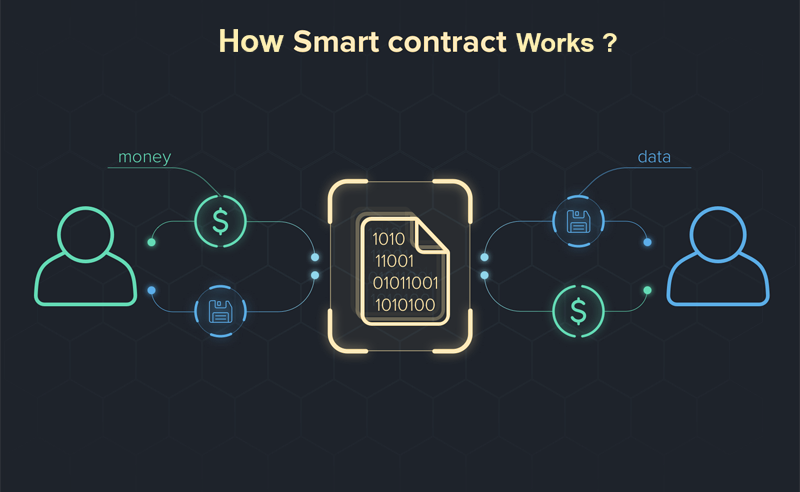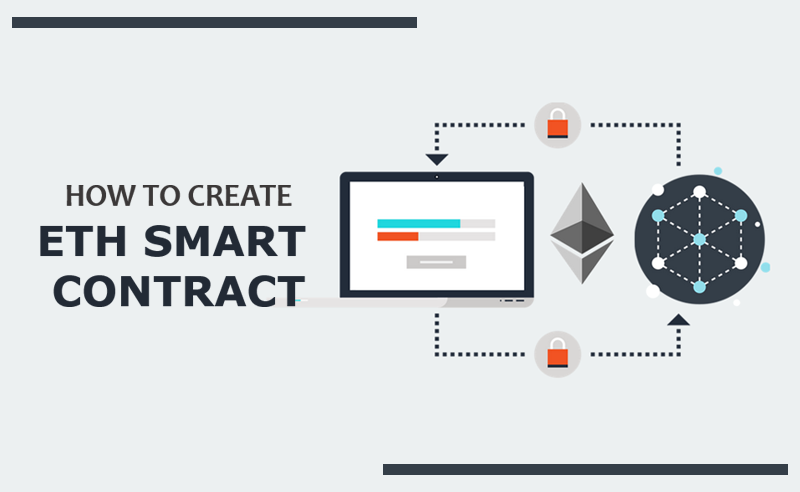Table of Contents
Ethereum, one of the popular Blockchain networks after that of Bitcoin in crypto space was launched in 2016 with some of the new approaches. Ethereum was introduced by the Canadian Russian programmer, Viltalik Buterin with the mission to improve the crypto space by solving the challenges faced by the Bitcoin network. Consensus mechanism or Proof-of-Work, Better security infrastructure, improved opportunity for app developers, and digital contracts were introduced by the Ethereum network. The success of the network is significantly dedicated to the platform for DApps and the implementation of smart contracts. Efforts of Nick Szabo, back in 1996, conceptualizing the smart contracts inspired Vitalik who later introduced the concept in mainstream. This article aims to act as a guide to Ethereum smart contract and will help you in understanding the basics of developing smart contracts.
What Is Ethereum Smart Contract?
The first question that obviously hit your mind might be- What is Ethereum Smart Contract? In simple terms, a smart contract is like a traditional contract but made on blockchain technology and facilitating the transaction in digital assets. It can be defined as programmed/user-defined codes or protocols validating the transfer of payments among the people associated with that contract. Also, it is in a way account to satisfy common contractual conditions according to which calculation of transacting tokens take place.
Particularly, Ethereum smart contract is a script written in Solidity coding language and compiled in JSON (lightweight data-interchange format) and utilized by a particular address on the blockchain. Like you call a URL endpoint of a RESTful API to run any logic via HttpRequest, similarly smart contracts can be executed at a particular address after entering precise data on the Ethereum network to call the Solidity function (compiled and deployed). In a way, Ethereum smart contract can be termed as the fee proportional to the storage size of the block containing codes.
How Does Ethereum Contract Work?

Do I need to sign an agreement? Do I need a stamp paper to make a contract? What if, the other party back off? How does Ethereum smart contract work? Many of the similar questions might be banging in your head related to digital contracts. Let us help in clear some of your doubts. So, smart contract works on the principle of “If-Then”. If you pay a certain amount of your digital assets, Then the particular object or thing or any asset mentioned in the contract will be yours or you will own that thing. Ethereum network covers the issues related to the security and safety of your funds by priorly asking for your wallet address and providing the services related to the escrow account. The risk of losing the money or the transfer of a particular object gets minimalized by the blockchain network of Ethereum. Thus, smart contracts functions in an automated way leaving the possibility of negligible fraudulent practices.
How To Develop Ethereum Smart Contract?
Developing the Ethereum smart contract might not be a simple task if you are not skilled in particular coding language deployed by the Ethereum network. But through this guide to Ethereum smart contract, you can try to understand the process and requisites needed to build a contract.
Tools Needed To Write Smart Contracts
Before developing the Ethereum smart contract, you need to make sure that you have the listed tools in your system.
- Mist Browser: You need to download separate browser to interact with dApps needed to run Ethereum smart contract
- Truffle Framework: This tool is a development framework for Ethereum having built-in smart contract compilation, linking, deployment, and binary management.
- MetaMask: This tool helps in testing the Ethereum smart contract by allowing users to run Ethereum dApps in their browser without running all the nodes.
- Remix: It is a web browser-based Integrated Development Environment (IDE) allowing users to code in Solidity (contract oriented high-level language) smart contracts and then running and deploying them.

How to Build Smart Contract On Ethereum?
You can build a smart contract by going through the following steps:
- Once you had installed MetaMask in your browser, you need to create the wallet on the browser. Select or assure that you are working on Ethereum Network on the Meta browser.
- Now, you can start with writing the conditions of smart contract on the Remix browser IDE in Solidity programming language. With Remix, you can enjoy the features like checking overlapping variable names, syntax, error highlighting, integrated debugger, and many more.
- You need to create a .sol extension file on your browser by clicking on the “plus” icon on the left side.
- After you are done with coding, select the appropriate version of Compiler from Remix to compile solidity Ethereum smart contract code.
- Finally, you can utilize the smart contracts at the Ethereum test network by clicking on “Deploy”. Wait till the address of your smart contract is visible on the window of Remix.
- Don’t forget to have a test run of your code before deploying it to the mainstream.
Creating an Ethereum can be a daunting task, but the essential knowledge and individuals having the skills of writing codes can easily build Ethereum smart contracts.
Summing Up
Blockchain technology amazes with every new concept introduced on it. And now it is a smart contract which must be appreciated for its functionality, security and performance. Smart Contracts ensures the accuracy, timely transaction, and less chances of inaccuracy. Unlike the traditional contracts, alteration of the smart contracts is not an easy task, which helps in assuring the authenticity of the contract. This guide to Ethereum smart contracts mentions that Ethereum blockchain made the task of building the smart contracts easy as it provides the platform with inbuilt customizable protocols like that of ERC20, which can reduce the pain of coding the contract from scratch. Many other platforms like NEO, Nxt is also available for designing the blockchain-based smart contracts. With a number of benefits, smart contracts can be easily deployed in any type of process whether it is supply chain management, administering the logistics, database keeping, records maintaining while avoiding the chances of fraudulent practices.
Articles You May Read
- Cryptocurrency digest: US law enforcement caught crypto scammers
- Cryptocurrency Airdrops | Know Everything About Latest Airdrop
- How Does Blockchain Smart Contract Work? | Complete Guide On Smart Contract

